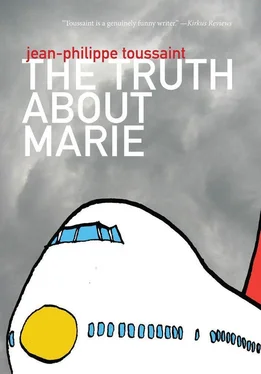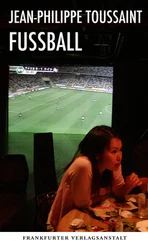Jean-Philippe Toussaint - The Truth about Marie
Здесь есть возможность читать онлайн «Jean-Philippe Toussaint - The Truth about Marie» весь текст электронной книги совершенно бесплатно (целиком полную версию без сокращений). В некоторых случаях можно слушать аудио, скачать через торрент в формате fb2 и присутствует краткое содержание. Год выпуска: 2011, Издательство: Dalkey Archive Press, Жанр: Современная проза, на английском языке. Описание произведения, (предисловие) а так же отзывы посетителей доступны на портале библиотеки ЛибКат.
- Название:The Truth about Marie
- Автор:
- Издательство:Dalkey Archive Press
- Жанр:
- Год:2011
- ISBN:нет данных
- Рейтинг книги:4 / 5. Голосов: 1
-
Избранное:Добавить в избранное
- Отзывы:
-
Ваша оценка:
- 80
- 1
- 2
- 3
- 4
- 5
The Truth about Marie: краткое содержание, описание и аннотация
Предлагаем к чтению аннотацию, описание, краткое содержание или предисловие (зависит от того, что написал сам автор книги «The Truth about Marie»). Если вы не нашли необходимую информацию о книге — напишите в комментариях, мы постараемся отыскать её.
revisits the unnamed narrator of Toussaint’s acclaimed Running Away, reporting on his now disintegrated relationship with the titular Marie — the story switching deftly between first- and third-person as the narrator continues to drift through life, and Marie does her best to get on with hers. Like all of Toussaint’s novels,
’s plot matters far less than its pace and tempo, its chain of images, its sequence of events. From pouring rain in Paris to blazing fires on the island of Elba, from moments of intense action to perfectly paced lulls,
relies on a series of contrasts to tell a beguiling, and finally touching, story of intimacy forever being regained and lost.
The Truth about Marie — читать онлайн бесплатно полную книгу (весь текст) целиком
Ниже представлен текст книги, разбитый по страницам. Система сохранения места последней прочитанной страницы, позволяет с удобством читать онлайн бесплатно книгу «The Truth about Marie», без необходимости каждый раз заново искать на чём Вы остановились. Поставьте закладку, и сможете в любой момент перейти на страницу, на которой закончили чтение.
Интервал:
Закладка:
Toward the end of the trip, while the boat approached the shores of Elba, my thoughts began to drift toward another night Marie had talked about, the night of her return from Japan. I hadn’t been with her that night, but I saw in a similar way the events unfold behind my closed eyes, with the main characters materializing and taking shape in my mind, faceless and nameless, and yet they were not inventions or chimeras but real people whose lives must have corresponded to what I saw in my mind. Lulled by the hypnotic hum of the boat’s engines, I watched these characters move silently in my mind, and, even if I was absent from the scenes unfolding behind my closed eyes, even if I wasn’t actively involved, even if I failed to appear physically among the other figures, I knew I was intimately present, not only as the sole source of each evocation, but at the heart of each and every character, to whom I was bound in ways unknown, with hidden and secret ties linking us together — for I was as much myself as each one of them.
My imperfect knowledge of what happened the night of Jean-Christophe de G.’s death, the many murky areas surrounding the events of that evening, were hardly a handicap for me. On the contrary, this forced me to employ my imagination to a much greater degree, pressed me to provide all the details in my mind, whereas had I really been there I’d simply have remembered everything. No, I wasn’t there that night, but I’d followed Marie in thought with the same emotional intensity as if I had been, as in a performance executed without me, not from which I am absent, but in which only my senses participate, as in dreams, where each figure is no more than an expression of one’s self, recreated through the prism of our own subjectivity, sprung from our own sensibility, our intelligence and fantasies. Even if I wasn’t fully asleep, my mind was seized by the irreducible mystery of dreams, that force which allows you to create extraordinarily elaborate images and which then arranges them in a series with no apparent order, with vertiginous gaps, areas that vanish into thin air and characters drawn from our own lives who merge seamlessly, fuse, transform into new beings, and, despite this radical incoherence, these images awake in us, with a blistering intensity, memories, desires, and fears, all of which, as happens rarely in life itself, give rise to true terror and love. For there is no third person in dreams, never, it is always a matter of one’s own self, as in “The Island of Anamorphosis,” an apocryphal story by Borges in which the writer who first invents the third person in literature ends up, after a long process of solipsistic decline, depressed and conquered, renouncing his invention to switch back to the first.
I was among the first to disembark when we arrived at Elba. Marie was waiting for me at the quay, she watched me come down the gangplank, her gaze attentive, veiled, beautiful. There was love the moment we saw each other again, from the first look, even if my arms, my hands, drawn toward her uncontrollably, didn’t act on the impulse my eyes betrayed. Reaching the quay, I simply put my hand on her shoulder, silently, not knowing what to say, letting my hand slide down her bare arm, our first physical contact in two months. It was Marie who’d invited me to join her in Elba, but clearly that didn’t imply any change in our relationship — we were still separated, even if, by sheer circumstance, our relationship had become new, ambiguous, unexpected.
As strange as it may sound, I made Marie happy, I’d always made her happy. Besides, I’d noticed that I made women happy, not all women in general, but each one in particular, each believing herself the only one, by her singular perspicacity, her penetrating gaze, and her feminine intuition, to detect in me hidden qualities no other woman could identify. Each of them was in fact convinced that these invisible qualities, which they’d detected in me, passed unnoticed to everyone except herself, whereas in reality many a woman was the only one to appreciate my secret qualities and to fall under my spell. It’s true, however, that these qualities were far from apparent, and, if too nuanced or subtle, my charm could be mistaken for dullness and my sense of humor as lacking, as only a thin line separates finesse from drabness.
On the way to La Rivercina, I became carsick almost immediately, I felt nauseous as soon as the route began curving. Marie pulled over on a cliffside, and I rushed out of the car to throw up (what a seducer, oh how she must have missed me!). Hands on my knees, sweat dripping off my forehead, with nothing left in my stomach, I continued to dry heave, only spitting out saliva, long elastic strings that swung down at my feet in the gravel. Marie had walked off to pick some flowers along the side of the road, she was wandering idly among the coastal scrub on the cliff side, a sprig of fennel sticking out of her mouth, on whose end she chewed while making a bouquet of wild flowers. I could see her from my stooped position, and I imagined the fresh flavor of the fennel on her tongue. When she came back toward me, I sketched a smile of apology with my characteristic and winning diffidence.
While her father was at La Rivercina, Marie and I used to sleep together on the first floor of the house, and I wondered now which room Marie was going to give me. She led me through the dark rooms on the first floor, and I followed her silently, we passed her father’s empty office, its blinds were closed, I glimpsed a stack of boxes in the half-light. She led me to her room as if from habit, and I was relieved she still wanted me to sleep with her on the first floor. But I had some indefinable feeling as I stepped into the room. Everything was in perfect order, no stray towels or wet bathing suits balled up on the floor, no open drawers, no hair dryers abandoned on the ground plugged into a nearby outlet. No, the room was impeccable, the curtains drawn, carefully tied on each side of the window, a pile of folded towels was placed on a chair as in a guest room. I put my bag down on a chair, and it was only then that I realized Marie wasn’t sleeping there with me, she was staying in her father’s room on the second floor.
Later that afternoon, Marie suggested we go for a swim. We drove to a small deserted cove where the lapping of waves and the hum of insects hardly broke the afternoon silence of the shore. Marie strode up to the water in her bathing suit, she’d picked up a stone and was bent over pulling mollusks off the rocks, which she then popped in her mouth as she continued to amble down the shore, sucking on the shells before throwing them back into the sea with a listless, sideways flick of the wrist. She collected winkles from the cracks in the rocks, holding a small heap of them in her cupped hand. She continued on her way, pensive, crouching at a rock that jutted halfway out of the water, its surface covered in moss and green algae and concretions of crenulated shells, a compact mass of balanomorpha, and, gripping her stone tightly, she tried to detach some miniscule mussels, their shells bristling with braided filaments. She walked back over to me and dumped her booty at my feet, spreading her hands wide and letting fall a cascade of wet shellfish that clinked as they fell into a loose pile at my feet (I tried to dodge them in vain by wiggling my toes in the air). Then, leaping over my body on the rocks, she grabbed a T-shirt and a pair of shoes, with which she built a small enclosure for the shellfish, a natural reserve, a fish pool of diverse vongole to add to our spaghetti later that night.
Marie had returned to the shoreline. She stood with her feet in the water and her hands on her hips, lost in contemplation, observing a sea anemone gently floating underwater at her feet, sinking and rising to the surface with the waves, its tentacles deployed and undulating in the current like transparent strands of hair waving in the water. Then, resolute, she entered the water, her arms spread, lifting them high lest the waterline reach her armpits, letting out clipped shrieks of protest, brief sharp cries expressing the thermal difference between her body and the sea, before letting herself fall back into the water joyously, submerging her head completely underwater. She frolicked thus for a bit, then asked me to bring her her snorkeling mask. I joined her in the water, and she began rinsing the snorkeling mask by my side, spitting into it to clean the goggles. She adjusted it and put it on underwater, taking a quick look around under the sea. There are a ton of sea urchins, she told me excitedly, in a slightly nasal tone, her nose pinched by the mask, and, swimming away from me, she dove headfirst into the water, her feet kicking wildly in the air before fully disappearing into the sea. She’d completely vanished in the deep water, only tiny bubbles rising to the surface gave her away. Having no tool, no small knife or fork, she stayed underwater for a long time, surging up suddenly out of breath and glancing around for me, her mask askew, spitting water out of the snorkel like the vertical spray of a whale, with, in her hands, three beautifully mauve and slimy urchins, their quills, still moving, covered with miniscule mineral or vegetal deposits, bits of algae and tiny pebbles, debris of colored stones, shards of broken shells. She got back on her feet and headed to shore, swaying her hips as she pushed against the current, slicing the water with her thighs. She grabbed a large stone from the rocks and opened the urchins, partially, breaking open their tests with blows of the stone, one after another, straightening her arms over the water and then shaking the shells energetically to remove any sea waste. She scooped out an orange-colored strip with the back of her finger and tasted it, first for herself, with a quick flip of her finger, as she brought it up to her mouth, then she offered me one when I got out of the water, still wet, feeding me tenderly two or three pieces (and I delighted in the taste of her wet finger as much as in the fresh and delicious urchin strips that melted in my mouth).
Читать дальшеИнтервал:
Закладка:
Похожие книги на «The Truth about Marie»
Представляем Вашему вниманию похожие книги на «The Truth about Marie» списком для выбора. Мы отобрали схожую по названию и смыслу литературу в надежде предоставить читателям больше вариантов отыскать новые, интересные, ещё непрочитанные произведения.
Обсуждение, отзывы о книге «The Truth about Marie» и просто собственные мнения читателей. Оставьте ваши комментарии, напишите, что Вы думаете о произведении, его смысле или главных героях. Укажите что конкретно понравилось, а что нет, и почему Вы так считаете.












